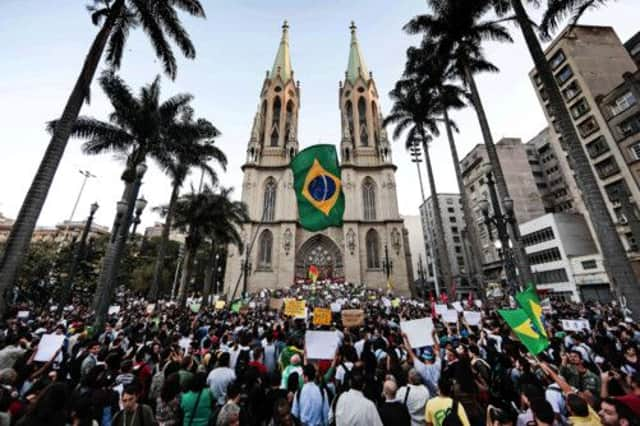Brazil players back protesters taking to streets


Brazil is hosting the Confederations Cup, a tournament of continental champions which serves as a warm-up for next year’s World Cup, but the Brazil players’ focus has turned to the demonstrations which this week have gripped a country fighting for improvements in basic services such as public transport, schools and hospitals.
The Brazil players had been trying to avoid the subject, but it became impossible not to talk about it after hundreds of thousands of people took to the streets in the past days to show their displeasure with politicians, authorities and local government.
Advertisement
Hide AdAdvertisement
Hide AdBrazil striker Hulk said that after seeing the demonstrations he felt “like joining them”.
“After seeing the people on the streets claiming for improvements, it makes me feel like joining them,” said the 26-year-old whose full name is Givanildo Vieira de Souza.. “They are doing the right thing, what they are saying makes sense and we have to hear them. Brazil needs to improve, we all know that.”
Nearly 240,000 people marched in ten Brazilian cities on Monday in protests that are turning into the most significant since the end of the 1964-85 military dictatorship, when crowds rallied to demand the return of democracy. It is also reminiscent of the early 1990s nationwide movement calling for the impeachment of then president Fernando Collor de Melo following corruption allegations and unpopular economic measures.
The protests continued yesterday, with federal troops sent to five cities to help maintain order around the football tournament, which began earlier this month.
“The people have the right to express their opinions and to protest when they are not happy with what is happening in their country. That’s the only way to call attention to what is wrong,” said Brazil defender David Luiz, who plays for Chelsea FC. “I don’t live in Brazil but I love my country. The Brazilians love their country. That’s why these protests are happening.”
The players got behind the demonstrators even though part of their anger is directly related to the high costs of hosting the Confederations Cup and the World Cup in 2014 when public services are so limited.
Last night, Brazilian leaders in Sao Paulo announced that they were reversing a ten cent hike in bus and subway fares that sparked the widespread protests, but it was not clear what impact the action would have on the public expressions of discontent.
The protests have evolved into communal outcries that have moved beyond the original demand that fares be lowered, focusing on the high taxes and high prices people pay while getting low-quality services and a corrupt, inefficient system of government.
Advertisement
Hide AdAdvertisement
Hide AdCampaigners have tried to use the Confederations Cup to attract attention to their causes, organising several demonstrations before matches in the six host cites.
The protests turned violent in Brasilia, Rio de Janeiro and Belo Horizonte, with police using rubber bullets and tear gas to keep the demonstrators from disrupting fans trying to get to the matches.
“The only thing we won’t support is violence,” David Luiz said. “I’m in favour of the right to express your opinion, but only if it’s done peacefully.”
The players had been avoiding the protests in news conferences, apparently trying to keep the issue from distracting team preparations, but some had already gone to social media sites to offer their opinions. “I’m in favour of the protests as long as they are peaceful,” Brazil striker Fred said on Facebook: “I’m very proud to see the people fighting to improve public transportation, health services and so many other things.”
Barcelona defender Daniel Alves and Bayern Munich defender Dante also expressed their support to the demonstrations.
Coach Luiz Felipe Scolari had been saying that he was only worried about preparing his team for the tournament and would not comment on anything else, but on Tuesday night he praised his players for giving their support to the movement.